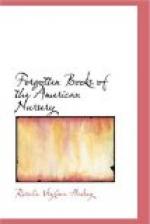With the constantly increasing population the production of children’s books grew more profitable, and in eighteen hundred and two Benjamin Johnson made an attempt to publish a “Juvenile Magazine” in Philadelphia. Its purpose was to be a “Miscellaneous Repository of Useful Information;” but the contents were so largely drawn from English sources that it was probably, like the toy-books, pirated from an English publisher. Indeed, one of the few extant volumes contains only one article of distinctly American composition among essays on Education, the Choice of a Wife, Love, papers on natural history, selections from poems by Coleridge and Cowper; and by anonymous makers of verse about Consumption and Friendship. The American contribution, a discussion of President Washington’s will, has already been mentioned.
In the same year, 1802, the “Juvenile Olio” was started, edited by “Amyntor,” but like Johnson’s “Juvenile Magazine,” was only issued at irregular intervals and was short-lived.
Other ventures in children’s periodicals continued to be made, however. The “Juvenile Magazine,” with “Religious, Moral, and Entertaining Pieces in Prose and Verse,” was compiled by Arthur Donaldson, and sold in eighteen hundred and eleven as a monthly in Philadelphia—then the literary centre—for twelve and a half cents a number. In eighteen hundred and thirteen, in the same city, the “Juvenile Portfolio” made its appearance, possibly in imitation of Joseph Dennie’s “Port Folio;” but it too failed from lack of support and interest.
Boston proved more successful in arousing attention to the possibilities in a well-conducted children’s periodical, although it was not until thirteen years later that Lydia Maria Child established the “Juvenile Miscellany for the Instruction and Amusement of Youth.” Three numbers were issued in 1826, and thereafter it appeared every other month until August, 1834, when it was succeeded by a magazine of the same name conducted by Sarah J. Hale.
This periodical is a landmark in the history of story-writing for the American child. Here at last was an opportunity for the editors to give to their subscribers descriptions of cities in their own land in place of accounts of palaces in Persia; biographies of national heroes instead of incidents in the life of Mahomet; and tales of Indians rather than histories of Arabians and Turks. For its pages Mrs. Sigourney, Miss Eliza Leslie, Mrs. Wells, Miss Sedgwick, and numerous anonymous contributors gladly sent stories of American scenes and incidents which were welcomed by parents as well as by children.




